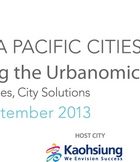ECCT LCI Pannel Discussions at 2013 APCS in Kaohsiung
The ECCT's Low Carbon Initiative (LCI) supported the summit by sharing with the city mayors and the audience its members' expertise and experience. Panels featuring LCI Speakers include:D. Decoding New Models of the Urban Cluster Economy
Moderators /Speakers Introduction
Metropolitan microeconomic clusters have led to regionally interconnected cooperation leading decision-makers to question what type of infrastructure fundamentals are essential? What influence will this new model of intercity competition have on urban development and what will be its actual effectiveness?
I. Building Safe and Livable Cities with Smart and Green Technologies
Moderators /Speakers Introduction
Ours is an age of high technology where information and sustainability are ubiquitous even to the point of transforming the livelihood of community residents, predetermining a city's place in the global market and determining the city's economic future. Siemens and IBM have observed global cities going "smart" and "green", and will share key strategies and lessons we can all learn from.
L. Low-Carbon City Initiatives: Case studies
Moderators /Speakers Introduction
A high degree of industrialization and increased urbanization intensified a wide range of environmental issues. Water recycling, waste management, air pollution and noise control are among the most common problems that global cities face. What are the conclusive key performance indicators and critical changes needed considering the diversity of city dimensions and organization?

